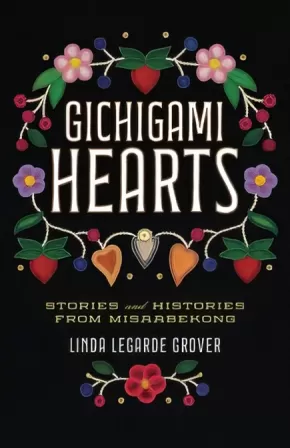
Bois Forte Band of Chippewa
1
-
3
of
3 Results;
Sort By
Fur Trade Nation: An Ojibwe's Graphic History
$42.16
Format:
Hardcover
ISBN / Barcode: 9781962910002
Synopsis:
Synopsis:
We clothed the royals. We fed the worker. We guided the traveler. We abetted the soldier. We are not afraid to love. So begins Carl Gawboy's groundbreaking graphic history of the Fur Trade Era. From 1650 to 1850, the Ojibwe Nation was the epicenter of the first global trading network. Trade goods from Africa, Asia, Europe, and South America flowed into the Great Lakes region, floating along Ojibwe waterways in birchbark canoes paddled by mixed-race Voyageurs. Gawboy offers a fresh perspective on the fur trade era, placing Ojibwe technology, kinship systems, cultural paradigms, and women at the heart of this remarkable era, where they have always belonged.
Additional Information
202 pages | 8.25" x 11.00" | Hardcover
A Song over Miskwaa Rapids: A Novel
$30.99
Format:
Hardcover
Text Content Territories:
Indigenous American; Native American; Anishinaabeg; Ojibwe (Chippewa);
Reading Level: N/A
ISBN / Barcode: 9781517914622
Synopsis:
Synopsis:
A fifty-year-old mystery converges with a present-day struggle over family, land, and history.
When a rock is dislodged from its slope by mischievous ancestors, the past rises to meet the present, and Half-Dime Hill gives up a gruesome secret it has kept for half a century. Some people of Mozhay Point have theories about what happened; others know—and the discovery stirs memories long buried, reviving a terrible story yet to be told.
Returning to the fictional Ojibwe reservation in northern Minnesota she has so deftly mapped in her award-winning books, Linda LeGarde Grover reveals traumas old and new as Margie Robineau, in the midst of a fight to keep her family’s long-held allotment land, uncovers events connected to a long-ago escape plan across the Canadian border, and the burial—at once figurative and painfully real—of not one crime but two. While Margie is piecing the facts together, Dale Ann is confronted by her own long-held secrets and the truth that the long ago and the now, the vital and the departed are all indelibly linked, no matter how much we try to forget.
As the past returns to haunt those involved, Margie prepares her statement for the tribal government, defending her family’s land from a casino development and sorting the truths of Half-Dime Hill from the facts that remain there. Throughout the narrative, a chorus of spirit women gather in lawn chairs with coffee and cookies to reminisce, reflect, and speculate, spinning the threads of family, myth, history, and humor—much as Grover spins another tale of Mozhay Point, weaving together an intimate and complex novel of a place and its people.
Reviews
"A sprawling, poignant chronicle of struggle and survivance."—Kirkus Reviews
"With its powerful, atmospheric descriptions of the natural world, A Song over Miskwaa Rapids resembles an Indigenous family saga in miniature, couching memory and mystery in a potent spirit world."—Foreword Reviews
Additional Information
128 pages | 5.50" x 8.25" | Hardcover
Gichigami Hearts: Stories and Histories from Misaabekong
$20.99
Format:
Paperback
Text Content Territories:
Indigenous American; Native American; Anishinaabeg; Ojibwe (Chippewa); Bois Forte Band of Chippewa;
Reading Level: N/A
ISBN / Barcode: 9781517911935
Synopsis:
Synopsis:
Award-winning author Linda LeGarde Grover interweaves family and Ojibwe history with stories from Misaabekong (the place of the giants) on Lake Superior.
Long before there was a Duluth, Minnesota, the massive outcropping that divides the city emerged from the ridge of gabbro rock running along the westward shore of Lake Superior. A great westward migration carried the Ojibwe people to this place, the Point of Rocks. Against this backdrop—Misaabekong, the place of the giants—the lives chronicled in Linda LeGarde Grover’s book unfold, some in myth, some in long-ago times, some in an imagined present, and some in the author’s family history, all with a deep and tenacious bond to the land, one another, and the Ojibwe culture.
Within the larger history, Grover tells the story of her ancestors’ arrival at the American Fur Post in far western Duluth more than two hundred years ago. Their fortunes and the family’s future are inextricably entwined with tales of marriages to voyageurs, relocations to reservation lands, encounters with the spirits of the lake and wood creatures, the renewal of life—in myth and in art, the search for meaning in the transformations of our day is always vital. Finally, in one man’s struggles, age-old tribulations, the intergenerational traumas of extended families and communities, and a uniquely Ojibwe appreciation for the natural and spiritual worlds converge, forging the Ojibwe worldview and will to survive as his legacy to his descendants.
Blending the seen and unseen, the old and the new, the amusing and the tragic and the hauntingly familiar, this lyrical work encapsulates a way of life forever vibrant at the Point of Rocks.
Reviews
"With compelling stories of sacred places, beloved people, myths, legends, and treasured memories, Gichigami Hearts is a moving tribute to the Ojibwe past."— Carolyn Holbrook, author of Tell Me Your Names and I Will Testify
"With stories of the essence of land and people, Linda LeGarde Grover weaves a generational history of a sacredness inseparable from place, of the unbroken chain of Anishinaabe existence in Missabekong. Her powerful prose and ethereal poetry wash over the pages like waves along the shore of Lake Superior, revealing a strength of survival that goes beyond memory and reminding us to watch, listen, and breathe."—Gwen Westerman, Minnesota State University, Mankato
"In Linda LeGarde Grover’s Gichigami Hearts, we are given the gift of an intensely personal, and at the same time brilliant, walkthrough of Grover’s part of the Anishinaabe universe. Just a tremendously lovely and unique book."—Erika T. Wurth, author of White Horse
Educator Information
Contents
Part I. Point of Rocks
Gabbro
An Old Story
Bimosewin: From the Bethel to the Union Gospel Mission
From the Rocks to the Docks
Anishinaabe Relatives and Holy Places
Grandparents
Life Among the Italians
The Beanbag
Rain, Fog, Ghost, Spider
Part II. Gichigami Hearts
Waawaashkeshi
Mooz
Lake Hearts
Lake Spirits
Sea Smoke on Gichigami
Barney-enjiss
The Stone Tomahawk
Part III. Rabbits in Wintertime
Listening and Remembering By Heart
Rabbits in the Snow
Niizh Odain: The Wolf and the Rabbit
The Harbor: Nanaboozhoo’s Brothers of the Heart
Woods Lovely, Dark, and Deep
Rabbits Watching Over Onigamiising
Part IV. Traveling Song
The End and Renewal of the Earth
Redemption
Mishomis
Grandfather-iban Gi-bimose
Places Remembered, Though Some Have Changed
Homeland
Traveling Song
Acknowledgments
Additional Information
200 pages | 5.50" x 8.50" | 8 Black and white illustrations | Paperback
Sort By









